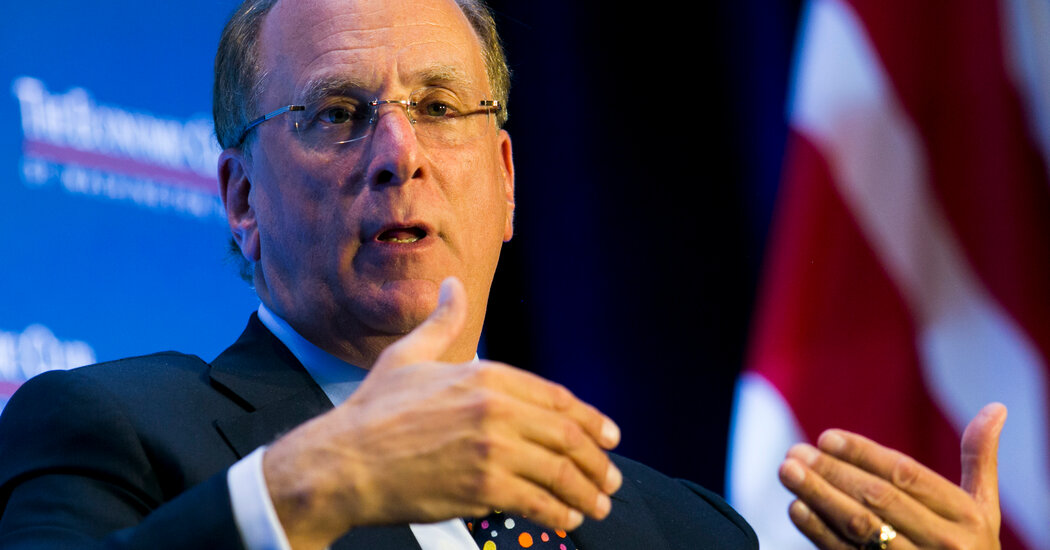Larry Fink’s latest annual letter to corporate America clarifies, and defends, his approach to social and environmental issues at the world’s largest money manager.
Laurence D. Fink, the founder and chief executive of the investment giant BlackRock, has become one of the most influential voices in business over the past decade in pushing corporate leaders to think beyond profits, to their social purpose.
Mr. Fink has delivered his words in annual letters that have drawn remarkable attention, but also criticism from all corners: that he is beholden to politically correct antibusiness activists, or that he is co-opting these issues for marketing purposes.
On Monday night, he used his latest letter to corporate America to clarify — and defend — his approach.
“Stakeholder capitalism is not about politics,” Mr. Fink wrote to the chief executives of businesses that BlackRock has invested in. “It is not ‘woke.’ It is capitalism.”
Mr. Fink’s annual letter is widely followed, and this year’s 3,300-word edition is sure to be read in boardrooms and beyond.
On Friday, BlackRock said it managed more than $10 trillion in assets, across an array of index funds, pension plans and other investment products, cementing the firm’s position as the world’s largest asset manager. That gives Mr. Fink a huge amount of influence: If a public company that BlackRock has invested in ignores his calls, his firm could seek to oust its directors or, among its actively managed funds, sell its shares.
So when Mr. Fink began urging chief executives four years ago to consider how they contributed to society, his words carried weight. Within weeks of his telling leaders in 2020 that climate change would become a “defining factor” in how BlackRock assessed their companies, many blue-chip businesses announced plans to become carbon-neutral or carbon-negative.
In this year’s letter, Mr. Fink urged chief executives to continue embracing their moral responsibility as the pandemic reshapes society and business, and as consumers and workers demand more from companies.
But in perhaps the most telling sentence, he said that what drove his push for companies to have purpose was creating profits. “Make no mistake, the fair pursuit of profit is still what animates markets; and long-term profitability is the measure by which markets will ultimately determine your company’s success,” he wrote.
Much of this year’s letter was devoted to Mr. Fink’s belief that a focus on environmental, social and corporate governance issues — E.S.G., for short — does not conflict with making money. Reducing a company’s carbon footprint, for example, makes the business more resilient in the long term, which is in investors’ interests.
“We focus on sustainability not because we’re environmentalists, but because we are capitalists and fiduciaries to our clients,” Mr. Fink wrote.
He suggested that E.S.G. was not a fad but a permanent feature of the corporate world. Business leaders who do not adapt to the new reality, he suggested, risk being overtaken by younger and more innovative rivals in step with the times.
“Capital markets have allowed companies and countries to flourish. But access to capital is not a right,” he wrote. “It is a privilege. And the duty to attract that capital in a responsible and sustainable way lies with you.”
But some critics say Mr. Fink and BlackRock are not pushing companies hard enough to go green. Environmental groups have called out what they see as shortcomings in Mr. Fink’s approach: BlackRock’s Big Problem, a collection of nonprofits and other advocates, accuses the firm of failing to exclude major polluters from its investment funds, even in E.S.G.-focused products.
In his latest letter, Mr. Fink defended his more gradual approach, including a refusal to force BlackRock to divest holdings in fossil-fuel companies. (He has said in the past that the firm cannot rid many of its mainstream funds of holdings in companies that are part of major stock indexes.)
“Divesting from entire sectors — or simply passing carbon-intensive assets from public markets to private markets — will not get the world to net zero,” he wrote. Focusing solely on cutting down on the supply of oil and gas, and not reducing the demand for fossil fuels, would simply drive up energy prices and encourage more of a backlash against green-energy efforts, he argued.
BlackRock has also faced pressure from the opposite end of the climate spectrum. Last year, Texas lawmakers passed a bill that, on paper, would block the state’s agencies from investing public money with financial companies, like BlackRock, if they were to “boycott energy companies.”
“If Wall Street turns their back on Texas and our thriving oil and gas industry, then Texas will not do business with Wall Street,” Lt. Gov. Dan Patrick, a supporter of the bill, posted on Twitter last year.
Mr. Fink’s letter did not address the Texas bill, and to date the state has not cut off BlackRock. He also said the firm would offer individual investors more ability to vote its shares, something BlackRock has been under pressure to do, especially by Republican lawmakers who have complained that the firm has too much influence. BlackRock is making it easier for institutions to vote themselves as well.
“We are pursuing an initiative to use technology to give more of our clients the option to have a say in how proxy votes are cast at companies their money is invested in,” Mr. Fink wrote. “We now offer this option to certain institutional clients, including pension funds that support 60 million people.”
Along with his push for companies to focus more on climate, he repeated a call on governments and multinational organizations like the World Bank to be more supportive of investments in green energy.
“Businesses can’t do this alone,” Mr. Fink wrote, “and they cannot be the climate police.”


























